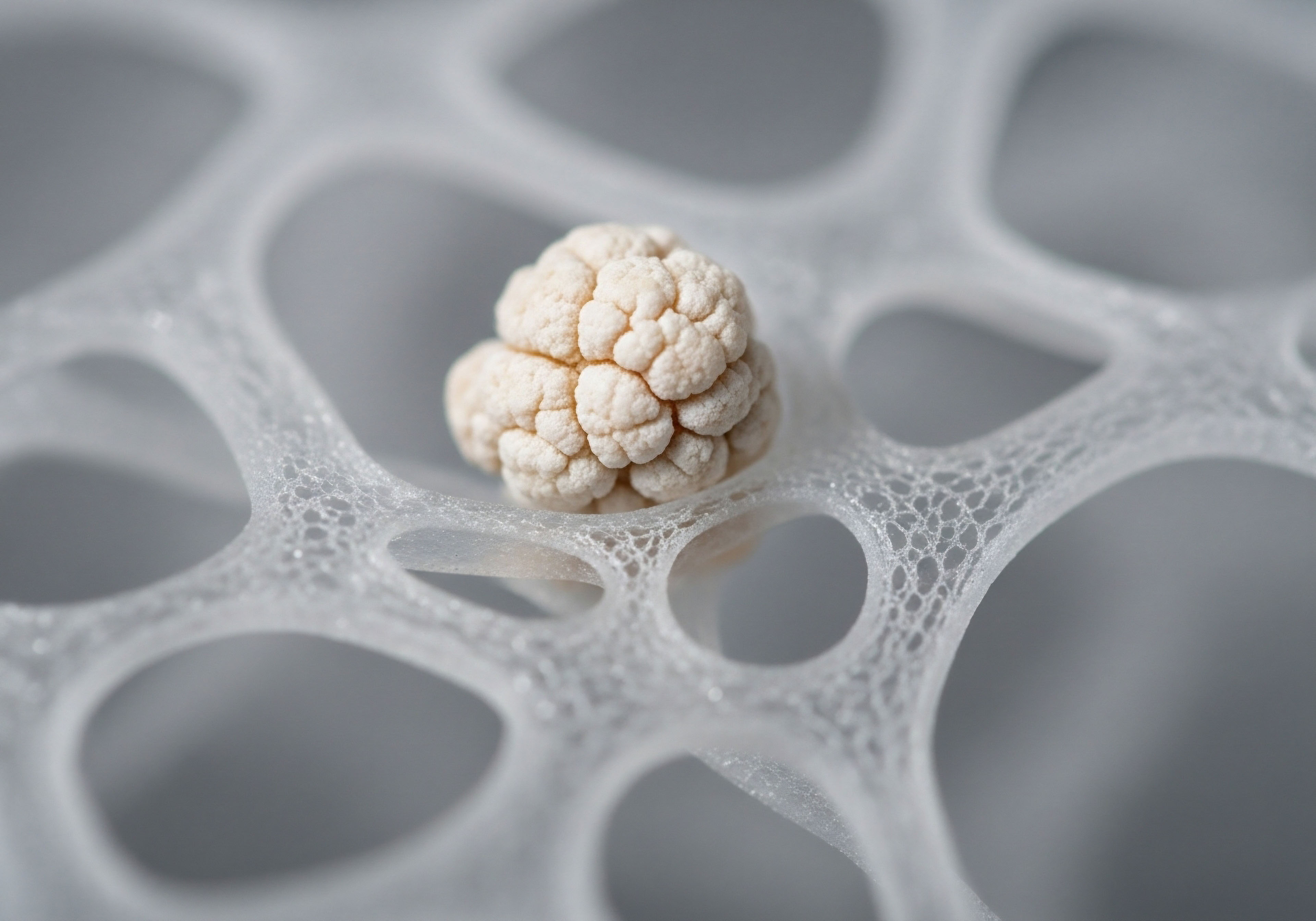

Reclaiming Your Biological Symphony
A profound sense of imbalance can permeate daily existence when your internal systems falter. You may experience persistent fatigue, inexplicable shifts in mood, or an unwelcome recalibration of your body composition. These subjective sensations often serve as initial indicators, signaling a deeper physiological dialogue within. Your body communicates through a complex, elegant language, employing hormones as its primary messengers. Understanding this intricate communication system marks a pivotal first step toward restoring optimal function.
The endocrine system operates as a grand orchestra, where each hormone plays a distinct, yet interconnected, role. These biochemical signals orchestrate nearly every bodily process, from energy regulation and sleep cycles to mood stability and reproductive vitality. When this delicate symphony falls out of tune, the resulting disharmony manifests as a cascade of symptoms. Recognizing these signals, both subtle and overt, empowers you to investigate the underlying biological mechanisms.
Hormonal symptoms represent the body’s sophisticated signals of internal physiological shifts.
Lifestyle choices inherently shape the endocrine landscape. The food you consume, the quality of your sleep, the intensity of your physical activity, and your methods for managing psychological stressors all send profound messages to your hormonal glands. These daily decisions do not simply influence superficial well-being; they directly impact the synthesis, transport, and receptor sensitivity of your vital hormones. Establishing a foundation of supportive lifestyle practices creates the necessary environment for hormonal equilibrium to flourish.

Understanding Your Body’s Internal Messengers
Hormones circulate throughout the bloodstream, seeking specific receptor sites on target cells to exert their effects. This precision messaging system ensures that physiological responses occur at the correct time and intensity. For instance, cortisol, often associated with stress, possesses a natural diurnal rhythm essential for waking and metabolic regulation. Disruptions to this rhythm, often precipitated by chronic stress or irregular sleep patterns, can lead to systemic dysfunction, impacting glucose metabolism and immune responses.
Biomarkers, measured through clinical laboratory assessments, provide objective data regarding your hormonal status. These measurements quantify the levels of specific hormones and their metabolites, offering a scientific lens into your internal environment. Connecting your lived experience of symptoms with these objective data points creates a comprehensive picture, allowing for a more precise understanding of your unique biological blueprint. This integrated perspective guides a truly personalized path toward wellness.


Lifestyle Interventions and Endocrine Resilience
Lifestyle interventions form the bedrock of endocrine health, offering powerful means to modulate hormonal function. These foundational practices, encompassing nutrition, movement, sleep hygiene, and stress mitigation, exert a profound influence on the body’s internal milieu. While their impact is substantial, a critical inquiry arises ∞ Can lifestyle modifications alone fully correct significant hormonal imbalances indicated by objective biomarkers? The answer often involves a nuanced understanding of physiological capacity and the depth of existing dysregulation.
Consider nutrition as a prime example. A diet rich in micronutrients, healthy fats, and adequate protein provides the essential building blocks for hormone synthesis and supports cellular receptor function. Conversely, dietary patterns characterized by excessive refined carbohydrates and inflammatory fats can contribute to insulin resistance, a metabolic state that profoundly disrupts sex hormone balance and adrenal function. The judicious selection of dietary components acts as a potent signal, informing the body’s metabolic machinery.
Targeted lifestyle practices serve as fundamental modulators of endocrine system function.
Physical activity also plays a central role in hormonal regulation. Regular, varied movement improves insulin sensitivity, enhances cardiovascular health, and influences the pulsatile release of growth hormone. Resistance training, in particular, supports anabolic processes, which contributes to the maintenance of muscle mass and bone density, both intrinsically linked to healthy hormonal profiles. A sedentary existence, conversely, can perpetuate states of metabolic stagnation and contribute to hormonal decline.

Hormonal Feedback Loops and Lifestyle Influence
The endocrine system operates through intricate feedback loops, akin to a sophisticated thermostat regulating internal temperature. When hormone levels deviate from optimal ranges, the body initiates compensatory mechanisms to restore equilibrium. Lifestyle interventions can support these intrinsic regulatory processes.
For example, consistent sleep patterns optimize the nocturnal secretion of growth hormone and support the healthy diurnal rhythm of cortisol, both essential for cellular repair and metabolic efficiency. Chronic sleep deprivation, however, can disrupt these rhythms, leading to elevated cortisol and impaired glucose regulation.
Stress management techniques, such as mindfulness or structured relaxation practices, directly impact the hypothalamic-pituitary-adrenal (HPA) axis. Prolonged activation of this axis, often a consequence of unmanaged psychological stress, can lead to chronic cortisol elevation. Sustained high cortisol levels can suppress thyroid function, impair sex hormone production, and contribute to insulin resistance. Proactive stress reduction helps recalibrate this crucial axis, promoting overall endocrine harmony.

When Lifestyle Requires Augmentation
Biomarkers provide invaluable insights, quantifying the extent of hormonal deviation. While lifestyle modifications can significantly improve many parameters, they may not always suffice to correct deeply entrenched imbalances. For instance, in cases of clinically diagnosed hypogonadism in men, where testosterone levels fall consistently below established thresholds, lifestyle alone often proves insufficient for restoring optimal physiological concentrations.
Similarly, women experiencing significant menopausal symptoms, often characterized by dramatic declines in estrogen and progesterone, may find lifestyle support beneficial but inadequate for complete symptom resolution.
This realization does not diminish the value of lifestyle; rather, it refines our understanding of its role. Lifestyle interventions become indispensable partners to targeted clinical protocols. They create a receptive physiological environment, enhancing the efficacy of prescribed hormonal optimization strategies.
| Lifestyle Pillar | Primary Hormonal Impact | Mechanism of Action |
|---|---|---|
| Nutrition | Insulin, Sex Hormones, Thyroid Hormones | Provides precursors for hormone synthesis, modulates insulin sensitivity, influences gut microbiome. |
| Movement | Insulin, Growth Hormone, Testosterone, Estrogen | Enhances glucose uptake, stimulates anabolic hormone release, improves metabolic flexibility. |
| Sleep Hygiene | Cortisol, Growth Hormone, Leptin, Ghrelin | Regulates circadian rhythms, optimizes nocturnal hormone secretion, supports appetite control. |
| Stress Management | Cortisol, Adrenaline, DHEA | Modulates HPA axis activity, reduces sympathetic nervous system overactivation. |
Adopting a comprehensive approach ensures that both foundational wellness practices and targeted clinical support work in concert. This integrated strategy aims to restore vitality and function without compromise.
- Balanced Nutrition ∞ Prioritize whole, unprocessed foods, ample protein, and diverse plant-based nutrients to support metabolic pathways.
- Consistent Movement ∞ Incorporate a blend of resistance training and cardiovascular activity to enhance insulin sensitivity and hormone production.
- Restorative Sleep ∞ Establish a regular sleep schedule and optimize your sleep environment to synchronize circadian rhythms.
- Mindful Stress Reduction ∞ Practice techniques such as meditation, deep breathing, or spending time in nature to calm the nervous system.


Beyond Homeostasis ∞ When Endogenous Regulation Fails
The intricate ballet of hormonal regulation, while remarkably robust, possesses inherent limits. Lifestyle interventions, while profoundly influential at the level of cellular signaling and metabolic efficiency, may encounter physiological thresholds where endogenous corrective mechanisms become insufficient. A deep exploration into the molecular and systems-biology underpinnings reveals precisely why targeted clinical protocols frequently become necessary to restore hormonal equilibrium when biomarkers indicate significant, persistent deviations.
Consider the Hypothalamic-Pituitary-Gonadal (HPG) axis, a central regulator of reproductive and anabolic hormones. Chronic metabolic dysfunction, for example, stemming from sustained insulin resistance, can disrupt pulsatile GnRH release from the hypothalamus. This, in turn, impairs LH and FSH secretion from the pituitary, leading to diminished gonadal steroidogenesis.
At the cellular level, insulin resistance can reduce sex hormone-binding globulin (SHBG) production in the liver, increasing free androgen levels in women (contributing to conditions like PCOS) or altering bioavailable testosterone in men.
Lifestyle interventions optimize cellular function, yet persistent endocrine dysregulation often necessitates clinical support.
Lifestyle factors, such as diet and exercise, directly influence gene expression through epigenetic modifications, altering the transcription of enzymes involved in hormone synthesis and metabolism. For instance, certain dietary polyphenols can modulate aromatase activity, influencing the conversion of androgens to estrogens. Physical activity can enhance androgen receptor sensitivity in muscle tissue, optimizing the anabolic response to existing testosterone.
However, when the genetic predisposition or prolonged environmental stressors lead to significant downregulation of these pathways, lifestyle alone may not generate sufficient physiological force to recalibrate the system to optimal function.

Molecular Crossroads of Hormonal Imbalance
The interplay between the HPA axis (stress response), HPT axis (thyroid function), and HPG axis is a prime example of interconnectedness. Chronic HPA axis activation, characterized by sustained cortisol elevation, can directly inhibit TRH and TSH secretion, leading to functional hypothyroidism even with structurally normal thyroid glands. Moreover, elevated cortisol can suppress GnRH and LH, impacting sex hormone production. This complex cross-talk illustrates that an imbalance in one axis inevitably cascades across others, creating a systemic challenge.
In such scenarios, where the “thermostat” of endogenous regulation is fundamentally recalibrated to a suboptimal set point, exogenous hormonal support becomes a precise intervention. Testosterone Replacement Therapy (TRT) for men with clinical hypogonadism, for instance, aims to replenish physiological levels of testosterone, directly addressing the deficit.
The protocol often involves weekly intramuscular injections of Testosterone Cypionate, frequently augmented with Gonadorelin to preserve endogenous testicular function and Anastrozole to manage potential estrogen conversion. These interventions provide the necessary biochemical signal that the body is no longer adequately producing.

Targeted Peptide Therapies and Synergistic Support
Peptide therapies represent a sophisticated avenue for modulating specific biological pathways, often working synergistically with lifestyle. Growth Hormone Releasing Peptides (GHRPs) such as Ipamorelin or Sermorelin stimulate the pituitary gland to produce more endogenous growth hormone, rather than introducing exogenous GH. This approach respects the body’s natural pulsatile release, minimizing potential side effects. These peptides can support muscle protein synthesis, fat metabolism, and cellular repair, enhancing the benefits derived from optimized nutrition and exercise.
Another example includes peptides like PT-141 for sexual health, which acts on melanocortin receptors in the brain to influence libido. Pentadeca Arginate (PDA) supports tissue repair and inflammation modulation. These targeted interventions address specific deficits or optimize particular functions, providing a level of precision beyond what lifestyle alone can achieve when significant physiological recalibration is required. The integration of meticulous lifestyle practices with these advanced biochemical recalibrations offers a comprehensive strategy for restoring profound vitality.
| Biomarker | Clinical Significance | Lifestyle Influence | Intervention Rationale (if needed) |
|---|---|---|---|
| Total Testosterone | Androgen status, muscle mass, libido, mood. | Exercise (resistance), stress reduction, healthy fats. | TRT for clinical hypogonadism, fertility protocols. |
| Estradiol (E2) | Female reproductive health, bone density, mood. | Healthy weight, dietary fiber, phytoestrogens. | Estrogen replacement (peri/post-menopause), aromatase inhibitors. |
| Progesterone | Menstrual cycle regulation, mood, sleep. | Stress management, adequate sleep. | Progesterone therapy for luteal phase deficiency or menopausal symptoms. |
| Cortisol (Diurnal) | Stress response, glucose metabolism, inflammation. | Stress reduction, consistent sleep, balanced diet. | Adrenal support, HPA axis modulators. |
| Insulin Sensitivity | Glucose regulation, metabolic health. | Low-glycemic diet, regular exercise. | Metformin (if indicated), specific dietary protocols. |
| Thyroid Stimulating Hormone (TSH) | Thyroid function, metabolism, energy. | Iodine/selenium intake, stress reduction. | Thyroid hormone replacement (hypothyroidism). |
- Steroidogenesis Pathways ∞ Dietary fats provide cholesterol, the precursor for all steroid hormones, while micronutrients act as cofactors for enzymatic conversions.
- Receptor Sensitivity ∞ Exercise and anti-inflammatory diets enhance cellular receptor expression and binding affinity for hormones like insulin and androgens.
- Neurotransmitter Modulation ∞ Gut microbiome health, influenced by diet, impacts neurotransmitter synthesis, which in turn affects hypothalamic hormone release.
- Mitochondrial Function ∞ Optimized nutrition and consistent movement support mitochondrial biogenesis and ATP production, critical for all energy-dependent hormonal processes.

References
- Bhasin, Shalender, et al. “Testosterone therapy in men with androgen deficiency syndromes ∞ an Endocrine Society Clinical Practice Guideline.” Journal of Clinical Endocrinology & Metabolism, vol. 95, no. 6, 2010, pp. 2536-2559.
- Emanuele, Nicholas, and Mary Ann Emanuele. “The endocrine system ∞ Alcohol alters critical hormonal balance.” Alcohol Health & Research World, vol. 21, no. 1, 1997, pp. 53-64.
- Korkushko, Oleg V. et al. “Effect of epithalamin on the circadian rhythm of melatonin in elderly people.” Neuroendocrinology Letters, vol. 32, no. 1, 2011, pp. 69-74.
- Pickart, Loren, and Anna Margolina. “Anti-aging properties of GHK ∞ the human health copper peptide.” Journal of Aging Research & Clinical Practice, vol. 7, no. 2, 2018, pp. 100-107.
- Rochira, Vincenzo, et al. “Obesity, Dietary Patterns, and Hormonal Balance Modulation ∞ Gender-Specific Impacts.” Nutrients, vol. 15, no. 23, 2023, p. 4935.
- Szuhany, Kristin L. et al. “A meta-analytic review of the effects of exercise on brain-derived neurotrophic factor.” Journal of Psychiatric Research, vol. 60, 2015, pp. 56-64.
- Thurston, Rebecca C. et al. “Sleep characteristics and metabolic syndrome in midlife women.” Sleep, vol. 37, no. 2, 2014, pp. 243-251.
- Villareal, Dennis T. et al. “Hormonal and Metabolic Changes of Aging and the Influence of Lifestyle Modifications.” Mayo Clinic Proceedings, vol. 96, no. 3, 2021, pp. 788-814.

Your Personal Blueprint for Vitality
The journey toward hormonal equilibrium represents a deeply personal exploration, a dialogue with your own biological systems. Understanding the nuanced interplay between lifestyle choices and endocrine function marks a significant step, empowering you to move beyond passive observation of symptoms.
This knowledge equips you with the tools to proactively engage with your health, recognizing that genuine vitality stems from a coherent, integrated approach. Your unique physiological blueprint guides the path forward, affirming that reclaiming optimal function remains an achievable aspiration, not merely a distant possibility.



